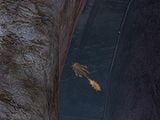Flood spore: Difference between revisions
From Halopedia, the Halo wiki
Sith Venator (talk | contribs) |
m (→Description) |
||
| Line 14: | Line 14: | ||
'''Spores''' are the most basic of [[Flood]] forms that act as carriers of the parasite's infection. They are also crucial in the formation of [[Flood hive]]s and are an effective method of suffocating future hosts and clearing the area of uninfected hostiles. | '''Spores''' are the most basic of [[Flood]] forms that act as carriers of the parasite's infection. They are also crucial in the formation of [[Flood hive]]s and are an effective method of suffocating future hosts and clearing the area of uninfected hostiles. | ||
==Description== | ==Description and History== | ||
Spores are generally airborne, often clogging air filtration systems, allowing for more efficient access to host organisms. When infesting a location, the Flood often uses [[spore mountain]]s or [[Flood dispersal pod|spore capsules]] to quickly disperse spores into a planet's atmosphere and thus expedite the conversion of the local biota.<ref>'''Halo: Silentium''', ''page 232''</ref> The biomass that [[Flood launcher]]s launch at enemies will sometimes manifest into clouds of Flood spores.<ref>'''Halo Wars'''</ref> | Spores are generally airborne, often clogging air filtration systems, allowing for more efficient access to host organisms. When infesting a location, the Flood often uses [[spore mountain]]s or [[Flood dispersal pod|spore capsules]] to quickly disperse spores into a planet's atmosphere and thus expedite the conversion of the local biota.<ref>'''Halo: Silentium''', ''page 232''</ref> The biomass that [[Flood launcher]]s launch at enemies will sometimes manifest into clouds of Flood spores.<ref>'''Halo Wars'''</ref> | ||
While [[Flood infection form|infection forms]] are the Flood's standard means of infection, it is possible for a compatible host organism to be infected by spores alone. The spores will enter the body and go about interfacing with the host's biology, consuming the victim's biomass and replacing it with Flood biomass, leading to biological transformation.<ref>'''Halo: Evolutions''' — ''"The Mona Lisa"''</ref> The [[Sangheili]] [[Bero 'Kusovai]] was infected when he inhaled Flood spores. Because he was infected in this manner his rate of mutation was far slower than that done by an infection form, and he was not physiologically distorted in the same manner as those originating from the primary means of Flood infection are.<ref>'''Halo Graphic Novel''', ''"The Last Voyage of the Infinite Succor"''</ref> The [[Prophet of Truth]] was later infected in a similar manner at the [[Battle of the Citadel]].<ref>'''Halo 3''', campaign level ''[[The Covenant]]''</ref> | While [[Flood infection form|infection forms]] are the Flood's standard means of infection, it is possible for a compatible host organism to be infected by spores alone. The spores will enter the body and go about interfacing with the host's biology, consuming the victim's biomass and replacing it with Flood biomass, leading to biological transformation. <ref>'''Halo: Evolutions''' — ''"The Mona Lisa"''</ref> The [[Sangheili]] [[Bero 'Kusovai]] was infected when he inhaled Flood spores. Because he was infected in this manner his rate of mutation was far slower than that done by an infection form, and he was not physiologically distorted in the same manner as those originating from the primary means of Flood infection are.<ref>'''Halo Graphic Novel''', ''"The Last Voyage of the Infinite Succor"''</ref>This was also used to deadly effect during the Fall of High Charity. The [[Prophet of Truth]] was later infected in a similar manner at the [[Battle of the Citadel]].<ref>'''Halo 3''', campaign level ''[[The Covenant]]''</ref> | ||
==Trivia== | ==Trivia== | ||
Revision as of 07:51, February 10, 2017
| This article does not have enough inline citations and/or does not adhere to the proper citation format. You can help Halopedia by adding citations. |
Template:Flood Species Infobox
- "One single Flood spore can destroy a species."
- — Rtas 'Vadum[1]
Spores are the most basic of Flood forms that act as carriers of the parasite's infection. They are also crucial in the formation of Flood hives and are an effective method of suffocating future hosts and clearing the area of uninfected hostiles.
Description and History
Spores are generally airborne, often clogging air filtration systems, allowing for more efficient access to host organisms. When infesting a location, the Flood often uses spore mountains or spore capsules to quickly disperse spores into a planet's atmosphere and thus expedite the conversion of the local biota.[2] The biomass that Flood launchers launch at enemies will sometimes manifest into clouds of Flood spores.[3]
While infection forms are the Flood's standard means of infection, it is possible for a compatible host organism to be infected by spores alone. The spores will enter the body and go about interfacing with the host's biology, consuming the victim's biomass and replacing it with Flood biomass, leading to biological transformation. [4] The Sangheili Bero 'Kusovai was infected when he inhaled Flood spores. Because he was infected in this manner his rate of mutation was far slower than that done by an infection form, and he was not physiologically distorted in the same manner as those originating from the primary means of Flood infection are.[5]This was also used to deadly effect during the Fall of High Charity. The Prophet of Truth was later infected in a similar manner at the Battle of the Citadel.[6]
Trivia
In Halo 4's Flood mode, the infected Spartan-IVs appear to be infected via spores, as they lack the infection form's tendrils, and the method of infection is direct contact with a combat form.
Gallery
- H2 Flood Spore.jpg
Another view of a Flood spore.
A Flood spore in containment on Installation 04.
List of appearances
- Halo 2 (First appearance)
- Halo Graphic Novel
- Halo 3
- Halo Wars
- Halo: Combat Evolved Anniversary
- Halo: Silentium (Mentioned only)
- Halo 2: Anniversary
- Halo: Shadow of Intent (Mentioned only)
Sources
| |||||||||||||||||||||||||||||||||

